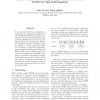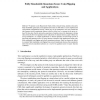241 search results - page 24 / 49 » On Generating Independent Random Strings |
126
Voted
CORR
2011
Springer
14 years 9 months ago
2011
Springer
In this paper, we study the average case complexity of the Unique Games problem. We propose a natural semi-random model, in which a unique game instance is generated in several st...
127
Voted
QOSA
2010
Springer
15 years 6 months ago
2010
Springer
Abstract. Software performance prediction methods are typically validated by taking an appropriate software system, performing both performance predictions and performance measurem...
110
click to vote
IEEEIAS
2009
IEEE
15 years 9 months ago
2009
IEEE
A computer worm is an autonomous malicious, selfreplicating and propagating piece of code that is able to spread fast in computer networks, exploiting the vulnerabilities it disco...
122
click to vote
NAACL
2003
15 years 4 months ago
2003
It is well known that frame independence assumption is a fundamental limitation of current HMM based speech recognition systems. By treating each speech frame independently, HMMs ...
118
click to vote
CORR
2011
Springer
14 years 9 months ago
2011
Springer
We propose a coin-flip protocol which yields a string of strong, random coins and is fully simulatable against poly-sized quantum adversaries on both sides. It can be implemented ...


